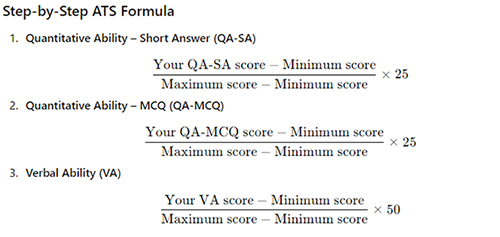If you are aspiring to join the prestigious 5-year Integrated Programme in Management (IPM) at IIM Indore, IIM Ranchi or IIM Amritsar, understanding the ATS (Aptitude Test Score) is essential. The ATS is a decisive factor that determines whether a candidate qualifies for the personal interview (PI) round. Scoring well in the ATS is your first step towards securing admission into the elite IIMs.
Meaning of ATS in IPMAT
ATS stands for Aptitude Test Score. It is a composite score calculated from your performance in the IPMAT exam, which consists of three sections:
- Quantitative Ability – MCQ (QA-MCQ)
- Quantitative Ability – Short Answers (QA-SA)
- Verbal Ability (VA)
Each section contributes to your final ATS, which is used to shortlist candidates for the interview round.
Why is the ATS Score Important?
The ATS score plays a pivotal role in the IPM admission process. It is the first filter that determines whether a candidate moves forward to the next stage: the Personal Interview. A high ATS score not only increases your chances of being shortlisted but also significantly impacts your final selection, as IIMs assign a substantial weightage to it in the overall admission criteria.
How is the ATS Score Calculated?
The ATS score is calculated based on normalized scores across the three sections of the IPMAT exam. Here's the breakdown of the calculation:
The final ATS score is the sum of all three section scores (each scaled as shown above), and it ranges from 0 to 100.
IPMAT Marking Scheme
To understand your raw scores before normalization, here is the marking scheme used in IPMAT:
- +4 marks for every correct answer
- -1 mark for every incorrect answer (for MCQs only)
- 0 marks for unattempted questions
These raw scores are then used to calculate the scaled ATS using the formula mentioned earlier.
Weightage of ATS in Final Selection
While the exact weightage may vary from year to year, historical trends suggest that ATS holds a 65% to 75% weightage in the final selection process. For instance:
- IIM Indore: 65% weightage to ATS and 35% to the Personal Interview
- Other IIMs (like IIM Ranchi or IIM Amritsar): Similar trends apply, though specific ratios may vary
Thus, scoring high in ATS is critical, as even a strong interview performance may not compensate for a low aptitude score.
Minimum ATS Score for Selection
The minimum ATS score required to proceed to the interview round is not fixed. It depends on factors such as:
- Difficulty level of the exam
- Total number of applicants
- Overall performance trends
However, based on recent trends:
- An ATS score of 300+ (raw score) is generally considered safe and competitive
- Achieving this score greatly increases your chances of receiving a call for the interview
ATS Score: Key to Cracking IPMAT
To summarize, the Aptitude Test Score (ATS) is the most important determinant of your progression in the IPMAT selection process. Here’s why it matters:
- Acts as the primary shortlisting tool for the interview round
- Holds major weightage in the final composite score
- Requires focused preparation across all three sections—QA (MCQ), QA (Short Answer), and Verbal Ability
Tips to Maximize Your ATS Score
- Prioritize sectional preparation to meet individual cut-offs in each section
- Practice rigorously to avoid negative marking in MCQs
- Strengthen your concepts in mathematics and English to score well in both Quant and Verbal sections
- Aim for consistency across all three sections rather than relying on a single strong area
Conclusion
A high ATS score is your ticket to the interview round and ultimately to admission into the IPM program at IIM Indore, IIM Ranchi, and IIM Rohtak. With 65–75% of the final selection weightage depending on this score, it is not just important—it is critical. Instead of merely clearing the minimum cut-off, set your target high (300+ raw score) and back it with strategic and disciplined preparation. Focus on accuracy, speed, and concept clarity—and you’ll be well on your way to joining one of India’s top IIMs.
